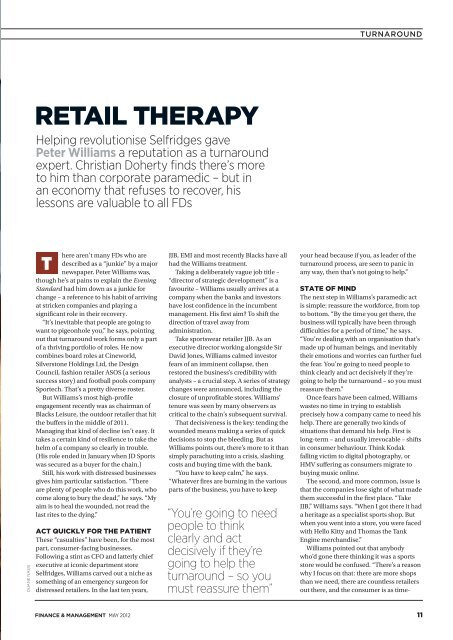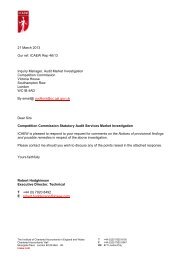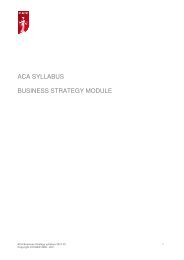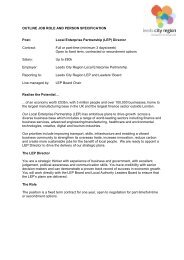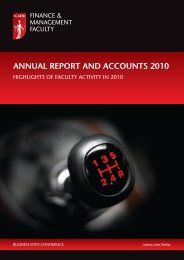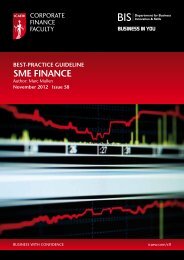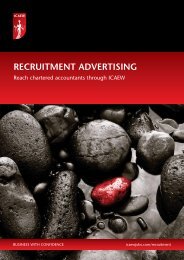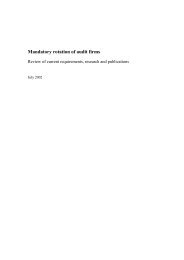Hit the road Positive leadership for troubled times - ICAEW
Hit the road Positive leadership for troubled times - ICAEW
Hit the road Positive leadership for troubled times - ICAEW
You also want an ePaper? Increase the reach of your titles
YUMPU automatically turns print PDFs into web optimized ePapers that Google loves.
TURNAROUND<br />
RETAIL THERAPY<br />
Helping revolutionise Selfridges gave<br />
Peter Williams a reputation as a turnaround<br />
expert. Christian Doherty finds <strong>the</strong>re’s more<br />
to him than corporate paramedic – but in<br />
an economy that refuses to recover, his<br />
lessons are valuable to all FDs<br />
DUANE NASIS<br />
T<br />
here aren’t many FDs who are<br />
described as a “junkie” by a major<br />
newspaper. Peter Williams was,<br />
though he’s at pains to explain <strong>the</strong> Evening<br />
Standard had him down as a junkie <strong>for</strong><br />
change – a reference to his habit of arriving<br />
at stricken companies and playing a<br />
significant role in <strong>the</strong>ir recovery.<br />
“It’s inevitable that people are going to<br />
want to pigeonhole you,” he says, pointing<br />
out that turnaround work <strong>for</strong>ms only a part<br />
of a thriving portfolio of roles. He now<br />
combines board roles at Cineworld,<br />
Silverstone Holdings Ltd, <strong>the</strong> Design<br />
Council, fashion retailer ASOS (a serious<br />
success story) and football pools company<br />
Sportech. That’s a pretty diverse roster.<br />
But Williams’s most high-profile<br />
engagement recently was as chairman of<br />
Blacks Leisure, <strong>the</strong> outdoor retailer that hit<br />
<strong>the</strong> buffers in <strong>the</strong> middle of 2011.<br />
Managing that kind of decline isn’t easy. It<br />
takes a certain kind of resilience to take <strong>the</strong><br />
helm of a company so clearly in trouble.<br />
(His role ended in January when JD Sports<br />
was secured as a buyer <strong>for</strong> <strong>the</strong> chain.)<br />
Still, his work with distressed businesses<br />
gives him particular satisfaction. “There<br />
are plenty of people who do this work, who<br />
come along to bury <strong>the</strong> dead,” he says. “My<br />
aim is to heal <strong>the</strong> wounded, not read <strong>the</strong><br />
last rites to <strong>the</strong> dying.”<br />
ACT QUICKLY FOR THE PATIENT<br />
These “casualties” have been, <strong>for</strong> <strong>the</strong> most<br />
part, consumer-facing businesses.<br />
Following a stint as CFO and latterly chief<br />
executive at iconic department store<br />
Selfridges, Williams carved out a niche as<br />
something of an emergency surgeon <strong>for</strong><br />
distressed retailers. In <strong>the</strong> last ten years,<br />
JJB, EMI and most recently Blacks have all<br />
had <strong>the</strong> Williams treatment.<br />
Taking a deliberately vague job title –<br />
“director of strategic development” is a<br />
favourite – Williams usually arrives at a<br />
company when <strong>the</strong> banks and investors<br />
have lost confidence in <strong>the</strong> incumbent<br />
management. His first aim? To shift <strong>the</strong><br />
direction of travel away from<br />
administration.<br />
Take sportswear retailer JJB. As an<br />
executive director working alongside Sir<br />
David Jones, Williams calmed investor<br />
fears of an imminent collapse, <strong>the</strong>n<br />
restored <strong>the</strong> business’s credibility with<br />
analysts – a crucial step. A series of strategy<br />
changes were announced, including <strong>the</strong><br />
closure of unprofitable stores. Williams’<br />
tenure was seen by many observers as<br />
critical to <strong>the</strong> chain’s subsequent survival.<br />
That decisiveness is <strong>the</strong> key: tending <strong>the</strong><br />
wounded means making a series of quick<br />
decisions to stop <strong>the</strong> bleeding. But as<br />
Williams points out, <strong>the</strong>re’s more to it than<br />
simply parachuting into a crisis, slashing<br />
costs and buying time with <strong>the</strong> bank.<br />
“You have to keep calm,” he says.<br />
“Whatever fires are burning in <strong>the</strong> various<br />
parts of <strong>the</strong> business, you have to keep<br />
“You’re going to need<br />
people to think<br />
clearly and act<br />
decisively if <strong>the</strong>y’re<br />
going to help <strong>the</strong><br />
turnaround – so you<br />
must reassure <strong>the</strong>m”<br />
your head because if you, as leader of <strong>the</strong><br />
turnaround process, are seen to panic in<br />
any way, <strong>the</strong>n that’s not going to help.”<br />
STATE OF MIND<br />
The next step in Williams’s paramedic act<br />
is simple: reassure <strong>the</strong> work<strong>for</strong>ce, from top<br />
to bottom. “By <strong>the</strong> time you get <strong>the</strong>re, <strong>the</strong><br />
business will typically have been through<br />
difficulties <strong>for</strong> a period of time,” he says.<br />
“You’re dealing with an organisation that’s<br />
made up of human beings, and inevitably<br />
<strong>the</strong>ir emotions and worries can fur<strong>the</strong>r fuel<br />
<strong>the</strong> fear. You’re going to need people to<br />
think clearly and act decisively if <strong>the</strong>y’re<br />
going to help <strong>the</strong> turnaround – so you must<br />
reassure <strong>the</strong>m.”<br />
Once fears have been calmed, Williams<br />
wastes no time in trying to establish<br />
precisely how a company came to need his<br />
help. There are generally two kinds of<br />
situations that demand his help. First is<br />
long-term – and usually irrevocable – shifts<br />
in consumer behaviour. Think Kodak<br />
falling victim to digital photography, or<br />
HMV suffering as consumers migrate to<br />
buying music online.<br />
The second, and more common, issue is<br />
that <strong>the</strong> companies lose sight of what made<br />
<strong>the</strong>m successful in <strong>the</strong> first place. “Take<br />
JJB,” Williams says. “When I got <strong>the</strong>re it had<br />
a heritage as a specialist sports shop. But<br />
when you went into a store, you were faced<br />
with Hello Kitty and Thomas <strong>the</strong> Tank<br />
Engine merchandise.”<br />
Williams pointed out that anybody<br />
who’d gone <strong>the</strong>re thinking it was a sports<br />
store would be confused. “There’s a reason<br />
why I focus on that: <strong>the</strong>re are more shops<br />
than we need, <strong>the</strong>re are countless retailers<br />
out <strong>the</strong>re, and <strong>the</strong> consumer is as time-<br />
FINANCE & MANAGEMENT MAY 2012<br />
11


